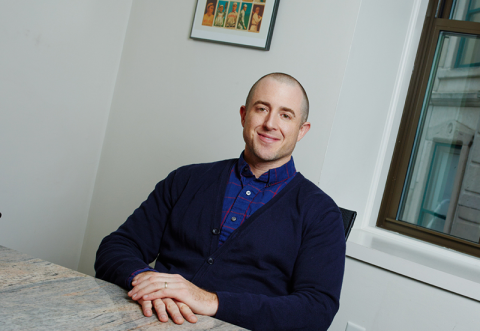From Berklee to Business, Investment CEO McDermott ’02 Sets the Beat

Daniel McDermott '02, CEO of Brighton House Associates
Image credit: Dave Green
Daniel McDermott is the founder and CEO of Brighton House Associates, a Boston-based alternative investment firm that serves more than 26,000 investors with more than 1,000 fund managers. However, before he plunged into the world of finance, the 38-year-old McDermott found his groove in music, graduating from Berklee 2002. In this conversation, McDermott discusses how he traveled from ambitions to be a professional drummer to his current gig.
Why Berklee? When you chose to enroll in 1998, what were your goals at that time?
“I went to Berklee because I was looking to be a professional musician. My father had gone to Berklee. For the style of music that I was interested in—jazz, funk, and fusion—Berklee was the number one place to be. I knew it was the best in the world, and I wanted to learn from the best teachers.
I did music studies at the University of Connecticut for two years and then decided to transfer to Berklee. I started out as a performance major and transitioned to a professional music degree, where you could pull in different talents.”
Where did you grow up, when did you get interested in music, and what did your parents hope for you?
“I grew up in Simsbury, Connecticut, outside Hartford, and caught the music bug in my sophomore year of high school. I quit sports and started playing music all the time. My uncle is a professional musician. My father was a drummer; he had won a scholarship to Berklee in the late ‘70s. He was there when the big-name players at the time, such as Pat Metheny, were there.
My parents never steered me in a certain direction for a career. When I decided to go to Berklee, that was great, and when I went into business after that, they were happy with that.”
What happened? Why the career switch from drums to business?
“In 2002, I was looking toward a career after Berklee. I loved music, but I realized that as a professional drummer, it meant probably having to move to New York City, having to gig, having to teach. You have to devote yourself to it 100 percent. I didn’t find that future as enticing. I thought, 'I can always play, but I don’t want that lifestyle.' At the time, I was going to start a magazine focused on investments and lifestyle. It was my senior project.
Then a family friend in a hedge fund offered me an internship. Later, I cofounded Coastal Partners, a third-party company, to raise money for hedge funds and private equity investors. By 2006, there were so many players, not just within hedge funds, that I thought there must be ways to create more efficient systems.
Brighton House Associates started in 2007 as a way to capitalize on the efficiencies in raising funds. Our first product was an investor database. By 2015, we moved into active capital raising. Today, Brighton House is based in downtown Boston, and the alternative investments field is expected to be $20 trillion by 2020.”
Did your time at Berklee help you in your current career?
“One thing I tell people was vital: learning how to do something, putting in the time, and dedicating yourself without immediate monetary benefit. When I was in music, I practiced four hours a day—practicing in the dorm basement while everyone was out on a Friday night. You’re putting in the time, focusing on the end result. That process can be applied to anything you do.
What Berklee provided was that it was a highly competitive environment and taught me how to position myself for success when there are a lot of talented people competing for the same goal.”
Is music still a component of your life?
“I still practice and play. I have a drum set. But I have five young kids so I’m a little distracted. Will I be touring the world as a musician? Probably not in the near future.
I wish I could say I go listen to music, but I don’t see as many as I would like. Although when the greats come to town, I try to go hear them—Dave Weckle, Vinnie Colaiuta…”
What advice would you give a Berklee student?
“I would tell them to try to take every opportunity that is given to them—to make themselves available and be constantly willing to improve and consistently willing to take risks. Failure is a requisite part of success.”
